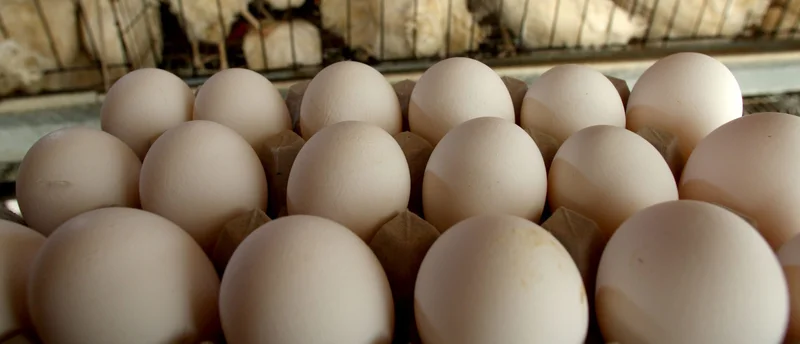Article Directory
So, how was your breakfast this morning? A little three-egg scramble, maybe? Over easy with a side of toast? I hope you enjoyed it, because every time you crack a shell these days, you’re basically playing a round of gastrointestinal Russian Roulette.
The latest proof comes to us from the ironically named Black Sheep Egg Company. The FDA just announced a recall of over 6 million of their eggs across three states, a development covered in the report 6 Million Eggs Recalled Over Salmonella—Check Your Fridge Now - Woman's World, because their facility in Arkansas is apparently a five-star resort for salmonella.
And I’m not being hyperbolic. When the inspectors showed up, they didn’t just find a little contamination. They found 40—that’s four-zero—environmental samples teeming with the stuff. We’re talking seven different strains of salmonella. This isn't a slip-up. This is a systemic, top-to-bottom failure. A facility doesn't just accidentally become a salmonella buffet. It’s like finding a single cockroach in your apartment versus finding a thriving, multi-generational cockroach civilization that has developed its own system of government. One is a problem; the other is a complete surrender of the territory.
So now, 6 million eggs are being pulled from shelves in Texas, Arkansas, and Missouri. The FDA, in its infinite wisdom, tells us to check for specific UPC codes and best-by dates between August and October of 2025. Give me a break. The responsibility is, as always, dumped right back on us. You, the consumer, are now expected to become a forensic accountant for your breakfast, cross-referencing serial numbers on a carton you probably already threw out.
The Illusion of Safety
Let's be real for a second. This whole recall song and dance is just theater. It's designed to make us feel like the system works. "Look!" the agencies shout. "We caught it! We're protecting you!" But they didn't catch it before millions of potentially contaminated eggs were shipped out and stacked neatly under the buzzing fluorescent lights of your local grocery store. They caught it after the fact.
The official advice is to "throw away the recalled eggs or return them." Thanks, guys. Groundbreaking stuff. They also recommend sanitizing any surface the eggs might have touched. Offcourse, because now your kitchen counter is a potential biohazard zone.
This is just incompetence. No, 'incompetence' is too clean a word—this is a fundamental breakdown of a system we're all forced to trust with our health every single day. We assume that when we buy something as basic as a carton of eggs, someone, somewhere, has done the bare minimum to ensure it won’t send us to the hospital with a fever and stomach pains for a week.

But that assumption is a joke. According to the Cleveland Clinic, we see millions of salmonella infections a year in the U.S., leading to around 420 deaths. It's just treated as a cost of doing business. A rounding error in the quarterly reports of massive food conglomerates. They'll issue a press release, talk about their "unwavering commitment to consumer safety," and honestly… what else is there to say? They know we'll forget by the next news cycle.
What I really want to know is what happens inside the Black Sheep Egg Company now. Do a few managers get a stern talking-to? Do they have to fill out some extra paperwork? Or is there any real, painful consequence for running a facility so dirty it cultivates a literal rainbow of bacteria? The details on that part always seem to remain conveniently scarce.
We're All Just Beta Testers
This isn't just about eggs. It's about everything. It's about the romaine lettuce, the peanut butter, the baby formula. Every few months, a new product gets the recall spotlight. For a week, we're all hyper-aware, inspecting labels and nervously Googling symptoms. Then, the outrage fades, and we go back to blindly trusting the supply chain.
The whole food system is like a massive, creaking piece of software that’s constantly being patched after a critical bug is discovered in the wild. We, the people eating the food, are the beta testers. And sometimes, the bugs are fatal.
We’ve outsourced our food production to a handful of massive, faceless corporations that operate on razor-thin margins. They fight regulations tooth and nail, cut corners on safety and sanitation to save a few pennies, and then act shocked when their facilities turn into pathogen playgrounds.
Maybe I'm the crazy one here. Maybe we're all just supposed to accept that a certain low level of food poisoning is the price of admission for cheap, convenient food. But it feels like the price keeps going up, and the people selling us the tickets are never the ones who have to pay it.
The Shell Game
At the end of the day, that's what this is. It's a shell game. The FDA, the corporations, the whole industrial food complex—they just keep moving the shells around, assuring us everything is fine. But we all know that under one of them is a contaminated product waiting to make us sick. This recall isn't a sign that the system is working; it's a reminder that the system is, and always has been, fundamentally broken. We’re just gambling every time we sit down to eat.
